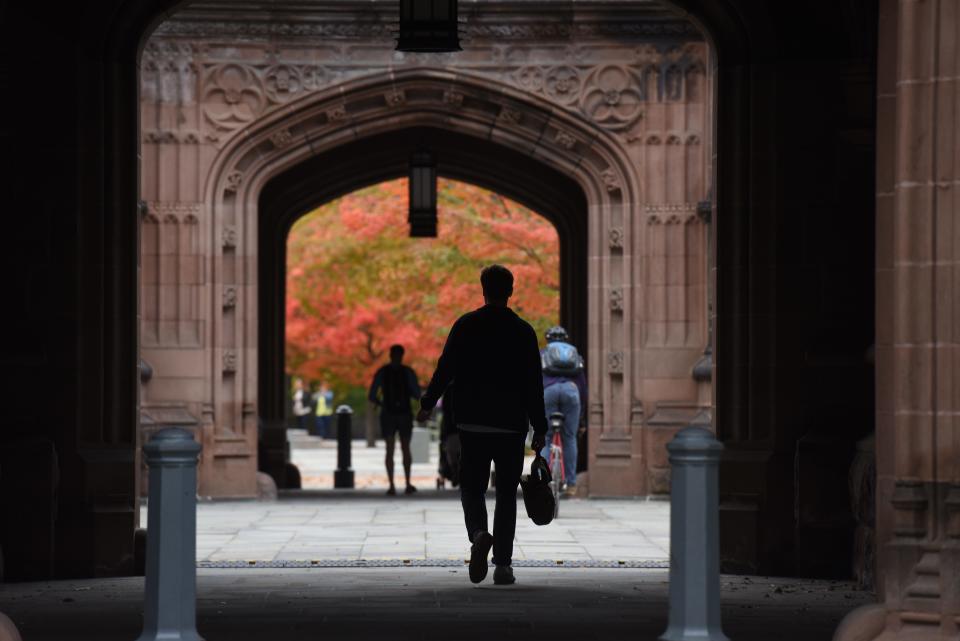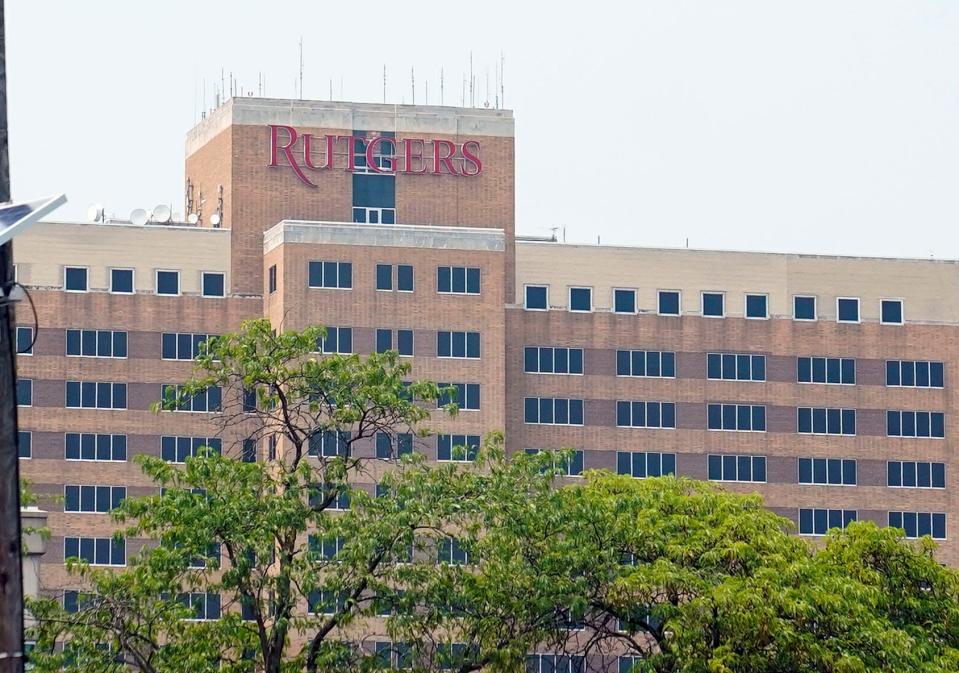DEI statements are shaking up higher education. Here's how New Jersey colleges use them
DEI — diversity, equity and inclusion — has become a lightning rod in U.S. politics, with at least a dozen states passing bills limiting the programs at colleges and universities.
The controversy has grown to include diversity statements — commitments made by incoming faculty to support campus DEI programs. UCLA faced criticism earlier this year when it chose not to hire a psychology professor who had questioned such statements in the past.
Elsewhere in California, six community college professors sued the state university system in August over regulations that they said would force them to espouse "politicized viewpoints" in order to keep their jobs.
In New Jersey, a survey of local colleges and universities suggests they are trying to walk a line, affirming their support for DEI without making it a requirement for new hires.

We surveyed colleges on DEI statements
In recent months, six schools responded to questions from The Record and NorthJersey.com about DEI statements. Four of them — Princeton, Montclair State, William Paterson and Ramapo College — said they do not require faculty to sign or submit DEI statements when hired.
However, Princeton University spokesperson Michael Hotchkiss said the school's departments and programs have the option during faculty searches of asking candidates to submit an "impact statement that can include the effect of a job candidate’s research, teaching, and service on expanding the diversity of the curriculum."
Rutgers University spokesperson Dory Devlin said the school “welcomes DEI statements, also called ‘contributions to inclusive excellence,’ from candidates seeking faculty positions, but does not require faculty to commit to DEI."
On the other hand, Fairleigh Dickinson University interim Provost Benjamin Rifkin said the school has a “requirement for a short statement about the applicants’ commitment (and experience, if applicable) to teaching learners of diverse backgrounds.”
The debate over diversity statements
Mike Gonzalez, a senior fellow at the Heritage Foundation, a conservative think tank in Washington, said diversity statements are unconstitutional because of what they demand of faculty and staff.
"Diversity statements are not only loyalty oaths that professors and would-be professors are asked to sign unconstitutionally, but DEI staff officers really become political commissars who enforce an ideology and tell students and staff what they can and can't say," Gonzalez said.
But Paulette Granberry Russell, president of the National Association of Diversity Officers in Higher Education, said schools that use such statements in faculty searches have done so to “gain a greater perspective of the experiences of individuals who will be working with a diverse student classroom.”
The recent criticism of DEI statements by those who see them as “loyalty statements" takes an overly simplistic view, she said. She was unaware of any such controversy on New Jersey campuses.
NJ colleges differ in how they use DEI

Garden State colleges may not require faculty commitments, but they said diversity, equity and inclusion play a valuable role in other ways.
Such programs expanded at colleges and universities in the aftermath of the killing of George Floyd in 2020 and the Black Lives Matter protests that followed. USA Today reported in February that at least a half-dozen colleges across the country offer DEI degree programs and more than 100 schools now offer intercultural or multicultural diversity studies programs, double what existed a decade earlier.
Where does DEI figure in the overall mission of some of New Jersey’s institutions of higher learning?
Ramapo College
Ramapo said “DEI is woven into the fabric” of the school and noted that DEI language is in the mission statement of the Mahwah school, as well as its Boldly Ascending strategic plan issued in July. According to Ramapo's 2022 fall enrollment report, 40% of its 4,932 undergraduates were students of color.
The strategic plan says one of Ramapo's goals is to "foster a diverse, empathetic, and vibrant community that inspires a culture of inclusivity, accountability, and collaboration."
The school has implemented various programs and initiatives to fulfill that goal in recent years, as shown on its website. They include a "rites of passage" pre-graduation ceremony to honor students of color who have successfully completed undergraduate or graduate degrees and a Diversity Day to celebrate differences and "reflect on and learn about different cultures and ideologies at Ramapo College."
Fairleigh Dickinson University
Rifkin, of Fairleigh Dickinson, said, "Our commitment to inclusion is part of what helps us prepare students to be global citizens and individuals whose professional and personal lives bring them into interactions with people of all kinds from all over the planet."
The university, which has campuses in Madison, Teaneck and Hackensack, had a combined enrollment for fall 2022 (based on currently available data) of 9,737 students, Among its undergraduates, 44% were white, 25% Hispanic, 7% Black and 6% Asian. Its graduate students were roughly the same breakdown.
FDU's effort to address DEI included in May joining the Moon Shot for Equity, a network of colleges and universities in the U.S. dedicated to eliminating equity gaps in higher education. FDU also created a Diversity, Equity, and Inclusion Advisory Council in September 2020.
Rutgers University
Rutgers, the state's largest public university, unveiled its Rutgers Forward: University Diversity Strategic Plan in March 2022. It's an extensive blueprint that, as President Jonathan Holloway explains in the document, lays out "action steps toward achieving comprehensive, university-wide diversity, equity, and inclusion" across the various campuses.
The university said it would "identify and enhance outreach and recruitment practices and explore holistic admissions processes and employing targeted practices to attract diverse student and trainee populations."
Montclair State University
The state's second-largest university has outlined steps for instructors to follow, known as Strategies for Immediate Implementation, that play a part in "creating an equitable and inclusive learning space." Among those steps, faculty members are to "make a commitment to culturally relevant pedagogy in your course, viewing students’ cultures as assets" and "select images and example names for your course with diversity and inclusivity in mind."
Princeton University
Princeton unveiled its Diversity, Equity, and Inclusion Action Plan during the 2021-2022 school year, and it outlined three main initiatives: research collaborations with minority-serving institutions, mentorship through a distinguished lecture series, and inclusive innovation and entrepreneurship.
William Paterson University
The university in Wayne has an Office for Student Diversity and Inclusion and a Center for Diversity and Inclusion for a student body that is nearly 60% students of color.
Is DEI good or bad?
Gonzalez, of the Heritage Foundation, said DEI has devolved in recent years into "unconstitutional activity" in which diversity becomes "racial quotas," inclusion becomes "language codes" that violate the First Amendment, and equity is even worse than the other two "because it sounds like equality but it's the functional opposite of equality."
Granberry Russell, of the diversity officers association, said DEI programs and policies are integral to how institutions of higher learning have evolved over time.
"I think we have to think historically about higher education, its purpose, its origins: who was served well, who was not served as well, who was invited in, who was denied access, and how over time [we are] moving from higher education experiences that were available mostly to white men in this country to postsecondary education that broadened experiences and opportunities and access based on a whole range of ways that people identify," she said.
The states that have been defunding and cutting DEI in colleges and universities have been pursuing it for political means, Granberry Russell said.
"Diversity, equity and inclusion has become a lightning rod for those who choose to politicize diversity, equity and inclusion as though it is practicing discrimination and that this work is exclusionary, which it is not," she said.
Ricardo Kaulessar covers race, immigration, and culture for NorthJersey.com. For unlimited access to the most important news from your local community, please subscribe or activate your digital account today.
Email: kaulessar@northjersey.com
Twitter: @ricardokaul
This article originally appeared on NorthJersey.com: Which NJ colleges require DEI statements for hiring? Here's a rundown

